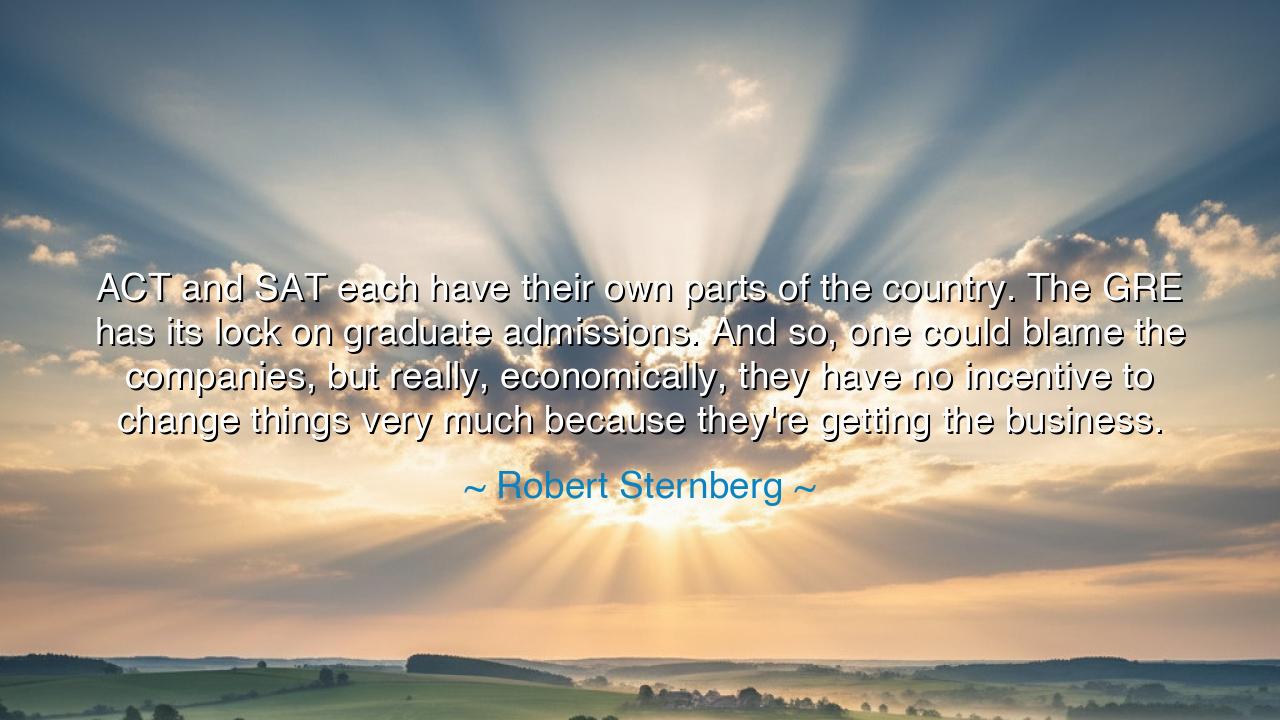
ACT and SAT each have their own parts of the country. The GRE has
ACT and SAT each have their own parts of the country. The GRE has its lock on graduate admissions. And so, one could blame the companies, but really, economically, they have no incentive to change things very much because they're getting the business.






The words “ACT and SAT each have their own parts of the country. The GRE has its lock on graduate admissions. And so, one could blame the companies, but really, economically, they have no incentive to change things very much because they're getting the business.” by Robert Sternberg reveal a piercing truth about the machinery of education — a truth both sobering and necessary. Beneath their calm and measured tone lies an ancient warning: when knowledge becomes commerce, wisdom begins to fade. Sternberg, a scholar of intelligence and creativity, speaks not with bitterness but with clarity. He reminds us that the systems built to measure learning have become instruments of profit, and thus, they rarely evolve, even when their purpose demands it. His words call upon us to see how the economy of testing has overshadowed the art of understanding.
In the style of the ancients, let us gaze into the heart of this matter. Once, education was a sacred path — a journey of awakening, where the student sought not grades but truth. But as time passed and societies grew more complex, standardized tests rose to power, promising fairness, simplicity, and measurable merit. The SAT, ACT, and GRE became gatekeepers to opportunity, the high priests of academic destiny. Yet like all institutions that wield power too long, they became rigid, more concerned with maintaining dominion than nurturing growth. Sternberg’s words expose this entanglement: companies thrive not by transforming education, but by preserving its inefficiencies — for what is profitable is not always what is just.
Consider the ancient tale of Diogenes, the philosopher who walked the streets of Athens with a lantern in daylight, searching for an honest man. Were he alive today, he might wander the halls of universities with that same lantern, seeking a system that measures true potential rather than memorized patterns. For what is intelligence, if not the capacity to adapt, to create, to discern meaning beyond numbers? Yet the modern mind has been trained to fear deviation. The test, the score, the percentile — these have become our modern oracles, and in bowing before them, we have forgotten that wisdom cannot be quantified.
The story of Robert Sternberg himself serves as a living illustration. As a boy, he struggled with standardized tests and was labeled as slow. The irony is profound: the very man who would later become one of the world’s leading psychologists on human intelligence once appeared “unintelligent” by the very systems he would later critique. His life became a rebellion against narrow definitions of intellect. He devoted his career to proving that creativity, wisdom, and practical intelligence matter as much as analytical ability. His success was not in perfecting the test, but in transcending it — in daring to say that a human mind cannot be caged by a multiple-choice question.
Sternberg’s words, then, are not merely about economics; they are about the moral inertia of institutions. He does not accuse the companies with malice, for he knows that the fault lies deeper — in human complacency, in society’s willingness to trade genuine understanding for the illusion of order. The companies do not change because we do not demand that they do. We have grown accustomed to equating a score with a soul. We have forgotten that education is meant to ignite, not merely to evaluate.
Dear listener, let this teaching stir your conscience: Do not confuse assessment with enlightenment. A test may measure what you know, but it cannot measure who you are. Systems may classify you, but only your character and creativity define your worth. Be wary of institutions that grow too comfortable in profit, for they will forget their higher calling. When the pursuit of wisdom yields to the pursuit of revenue, the spirit of learning begins to decay.
And so, the lesson endures: Seek education, not validation. Use the tools of the system, but never let them define the boundaries of your mind. Question the tests, challenge the assumptions, and remember that the greatest knowledge is often found beyond the page. Let your intelligence be measured not by what you recall, but by what you create — for in a world ruled by scores and scales, the truly wise are those who dare to think freely, even when the system profits from their silence.






AAdministratorAdministrator
Welcome, honored guests. Please leave a comment, we will respond soon